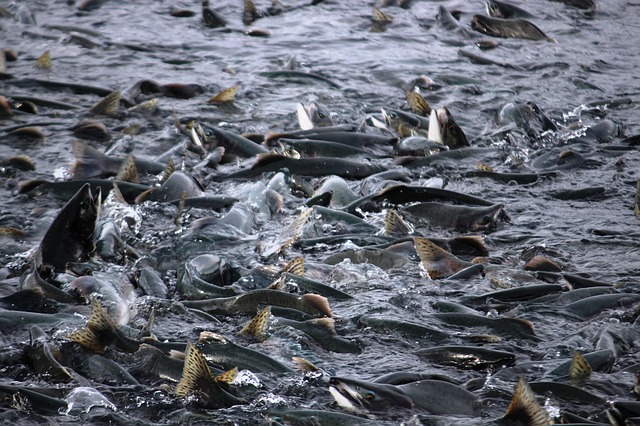
Genetically Modified Salmon Headed to Rivers and Stores
The US Food and Drug Administration (FDA) has been considering the approval of AquAdvantage genetically modified (GM) salmon since 1993. After reviewing the research, which reportedly came from the salmons' creator AquaBounty, the FDA concluded in 2012 that the fish was likely safe for human consumption and would not put the environment at risk.
Three years and a public commentary later, the FDA has yet to make a final approval, and environmentalists and food-safety advocates alike have expressed serious concerns about unleashing GM food animals into the US – a decision no other country in the world has approved.
July 28, 2015 | Source: Mercola.com | by Dr. Mercola
The US Food and Drug Administration (FDA) has been considering the approval of AquAdvantage genetically modified (GM) salmon since 1993. After reviewing the research, which reportedly came from the salmons’ creator AquaBounty, the FDA concluded in 2012 that the fish was likely safe for human consumption and would not put the environment at risk.1
Three years and a public commentary later, the FDA has yet to make a final approval, and environmentalists and food-safety advocates alike have expressed serious concerns about unleashing GM food animals into the US – a decision no other country in the world has approved.
The GM salmon are engineered to grow about twice as fast as typical farm-raised salmon. This is achieved by inserting the DNA from two other fish, a growth-promoting gene from a Chinook salmon and a “promoter” gene from the eel-like ocean pout, which essentially keeps the growth hormone flowing 24/7, leading to eerily fast growth.
While a typical salmon might take up to 36 months to reach market size (and grow only in spurts during warm weather), AquaAdvantage GM salmon is ready for market in just 16 to 18 months.2
Since it grows so fast, it requires less food (by about 25 percent) over the course of its lifetime – and half of its feed is replaced with plants instead of fish, making them about 0.25 cents a pound cheaper to produce than conventional salmon.3 All of these “benefits” may come at a steep price, however, should one of these GM salmon escape into the wild…
What Would Happen if GM Salmon Make It into the Wild?
AquaBounty’s GM salmon would be grown in tanks on land with additional filters, screens, and netting used to block any drains or pipes that could provide an outlet into nearby waterways.
And female eggs will be sterilized prior to leaving the facility, using a process that has a 99.8 percent sterilization rate (which means 0.2 percent are still fertile).4 Nonetheless, AquaBounty therefore claims any escape into the wild is “virtually impossible.”5
But if history is any indicator of future of events, the GM salmon will one day find a way into the natural environment. We’re already seeing the unintended consequences of GM crops popping up where they’re not supposed to.
And “super weeds” and increasingly resistant pests are rapidly spreading and wreaking havoc across American farmland, while the human health concerns keep mounting.
When scientists take genetic modification even further, tinkering with genes in insects and animals, the consequences may be even steeper.
When a Purdue University computer model tracked the effects of releasing just 60 “Frankenfish” (GM salmon) into a population of 60,000, there was a complete extinction of the normal fish in just 40 fish generations…
George Leonard, writing for the National Geographic, also addressed the issue of escape potential with the following statement:6
“While this initial application to grow GE salmon is for land-based facilities, the prospect of even larger profits from growing GE salmon in the ocean will certainly create pressure for approval in these more environmentally risky [ocean pen] systems in the future.
The U.S. is poorly equipped to deal with this future scenario. In June 2011, NOAA Administrator Dr. Jane Lubchenco released a National Aquaculture Policy to guide how marine aquaculture proceeds in our ocean waters. While the policy includes some strong environmental provisions, it does not categorically prohibit the growing of GE fish in the ocean. It should…
Congress should work to pass Senator Mark Begich’s PEGASUS [Prevention of Escapement of Genetically Altered Salmon in the United States] Act or similar legislation that requires FDA to take the environmental risks seriously before approving GE fish. If Congress doesn’t act soon, the nation’s ocean may suffer from FDA’s efforts to chart a course for GE salmon.”
